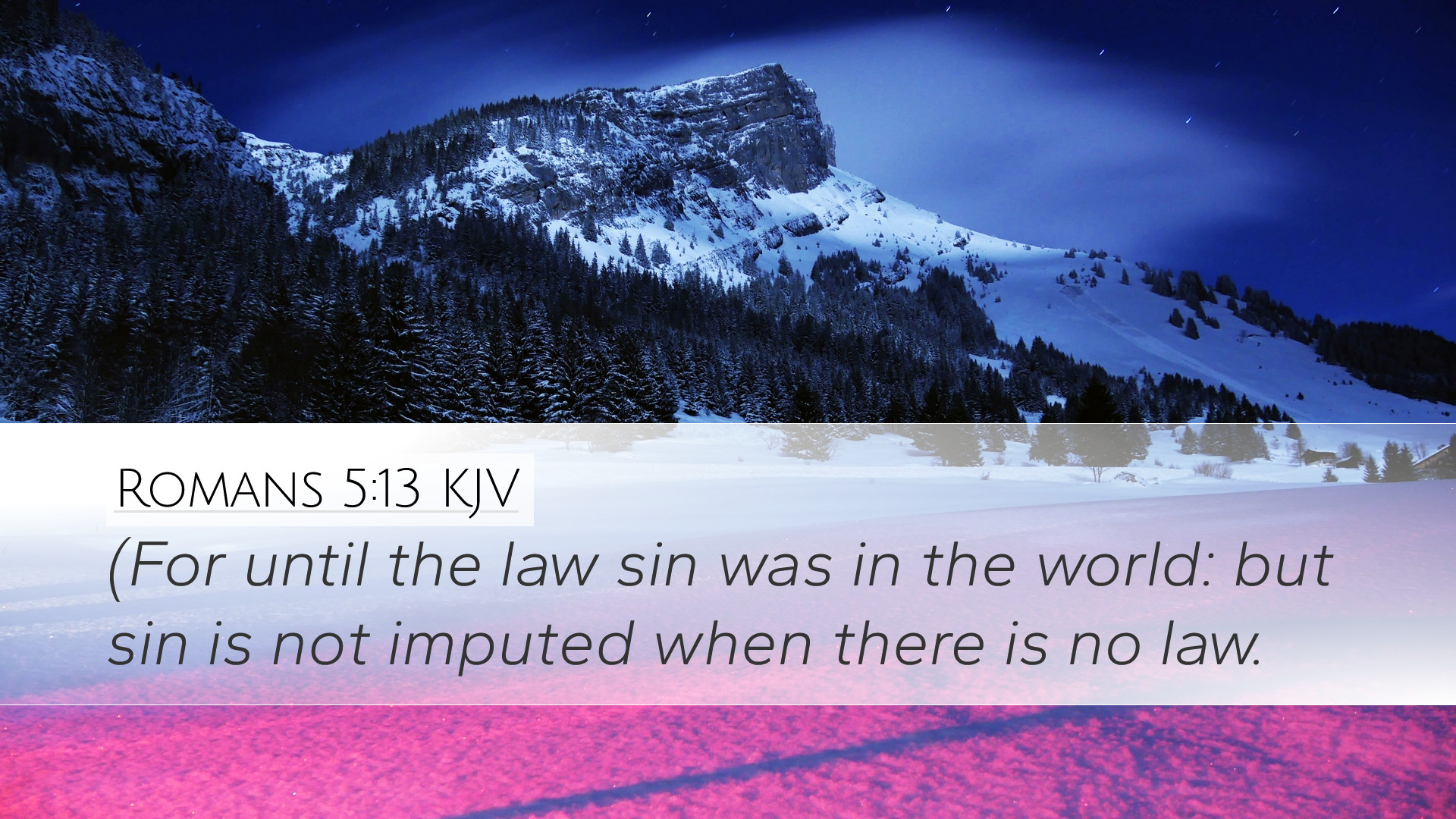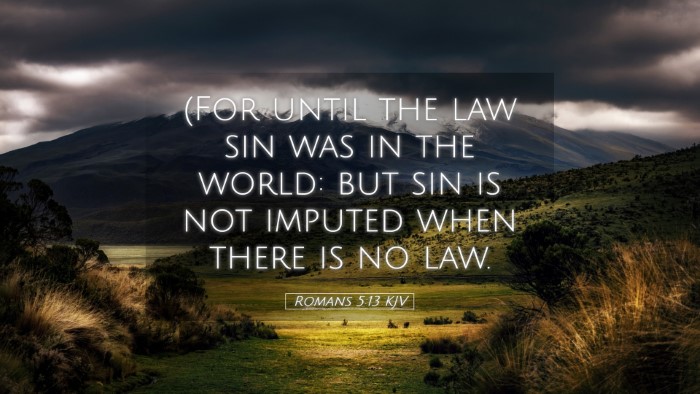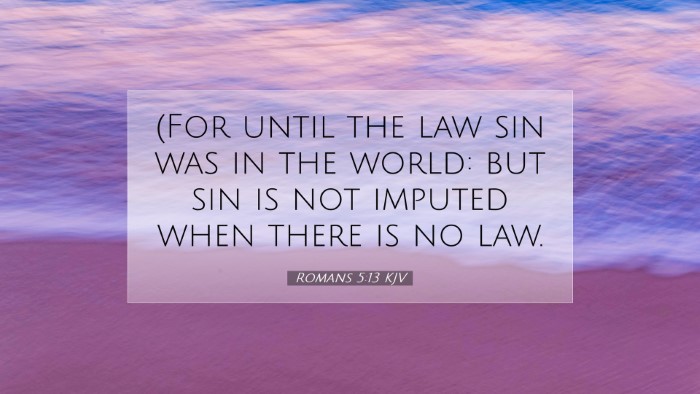Old Testament
Genesis Exodus Leviticus Numbers Deuteronomy Joshua Judges Ruth 1 Samuel 2 Samuel 1 Kings 2 Kings 1 Chronicles 2 Chronicles Ezra Nehemiah Esther Job Psalms Proverbs Ecclesiastes Song of Solomon Isaiah Jeremiah Lamentations Ezekiel Daniel Hosea Joel Amos Obadiah Jonah Micah Nahum Habakkuk Zephaniah Haggai Zechariah MalachiRomans 5:13
Romans 5:13 KJV
(For until the law sin was in the world: but sin is not imputed when there is no law.
Romans 5:13 Bible Commentary
Analysis of Romans 5:13
Romans 5:13 states: "For until the law sin was in the world: but sin is not imputed when there is no law." This verse serves as a pivotal point for understanding the relationship between sin and the law within the theological framework of Paul’s epistle to the Romans. The complexities of sin's existence before the law and the implications of grace are expounded through a blend of insights from well-respected biblical commentators.
Contextual Background
To fully grasp the significance of Romans 5:13, we must consider the surrounding verses that lead into this statement. Paul is articulating a narrative of sin entering the world through Adam, as introduced in verses 12-21, and the redemptive work of Christ. The law, less a means of salvation, serves to highlight human transgression.
Commentary Insights
Matthew Henry's Commentary:
Matthew Henry emphasizes the nature of sin in relation to the law. He interprets Romans 5:13 as an explanation of how sin existed prior to the Mosaic Law. According to Henry, the absence of law before Moses did not suggest an absence of sin; rather, it demonstrates that sin was conceptually present even if it was not formally recognized or labeled. Henry asserts that God's moral law has been inherent in humanity’s conscience from the beginning, thereby giving rise to sin as understood in a relational context.
Albert Barnes' Commentary:
Albert Barnes elaborates on the phrase, "sin is not imputed when there is no law," by suggesting that it refers to the notion that in situations devoid of explicit law, moral accountability is less formally acknowledged. Barnes argues that this does not imply a lack of sinfulness; instead, it denotes a lack of formal punishment or recognition as a violation of stated law. Barnes sees this verse as evidence of God's governance, where the conscience plays a role in governing actions even outside of formal legislation.
Adam Clarke's Commentary:
Adam Clarke takes a slightly different approach by focusing on the implications of sin's accounting in the absence of law. He points out that this verse delineates the transition from a state of sinfulness to one of accountability through law. Clarke asserts that while sin existed, its understanding and consequences were clarified with the giving of the law at Sinai. This critical moment in history illuminated the reality of sin in humanity and necessitated a savior.
Theological Implications
Theological reflection on Romans 5:13 highlights several important doctrines:
- Original Sin: Romans 5 articulates the doctrine of Original Sin, where Adam's transgression affects all humanity. The implications of sin spreading in the absence of law shed light on humanity's need for redemption.
- Grace and Law: The juxtaposition of grace as the answer to sin, especially in the context of the law, emphasizes the idea that where sin increases, grace abounds more abundantly, reinforcing the theme of salvation through faith rather than adherence to the law.
- Conscience and Moral Accountability: This passage also nudges a belief in the innate moral inclination of human beings, where sin is recognized through conscience, even without explicit laws.
Application for Pastors and Theologians
The exploration of Romans 5:13 invites deeper reflection regarding pastoral ministry and theological discourse.
- Pastoral Care: Understanding the presence of sin and the role of conscience can help pastors guide congregants in addressing moral dilemmas and spiritual struggles.
- Theological Education: For students and scholars, this verse can serve as a foundational text for discussions on soteriology, ethics, and the covenantal relationship between God and humanity.
- Evangelism: A comprehension of how sin operates amidst humanity provides a strong basis for preaching the necessity of Christ's atoning work and the critical response required from individuals for salvation.
Conclusion
In conclusion, Romans 5:13 enriches our understanding of sin, accountability, and grace. By contextualizing this verse within the greater narrative of redemption, and utilizing insights from ancient and esteemed commentators, we garner a profound appreciation for the complexity of sin's nature and the transformative power of God's grace. Each perspective—from Henry, Barnes, to Clarke—adds layers of meaning that can inform preaching, teaching, and personal reflection.


